The Box
 for thematic elements, some violence and disturbing images.
for thematic elements, some violence and disturbing images.
Reviewed by: Thaisha Geiger
CONTRIBUTOR
| Moral Rating: | Average |
| Moviemaking Quality: |
|
| Primary Audience: | Teens Adults |
| Genre: | Sci-Fi Horror Thriller |
| Length: | 1 hr. 55 min. |
| Year of Release: | 2009 |
| USA Release: |
November 6, 2009 (wide—2,500+ theaters) DVD: February 23, 2010 |
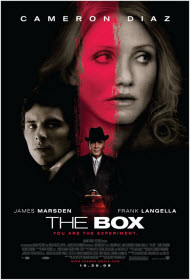



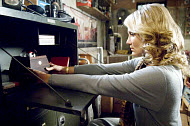
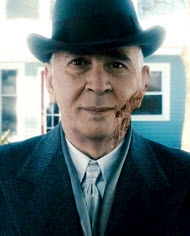



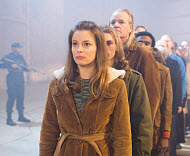
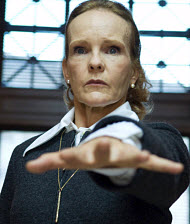

ANXIETY, worry and fear—What does the Bible say? Answer
money in the Bible
How do I know what is right from wrong? Answer
About murder and death in the Bible
ETERNAL LIFE—What does the Bible say about it? Answer
Eternal death in the Bible
| Featuring |
|---|
|
Cameron Diaz (Norma Lewis) James Marsden (Arthur Lewis) Frank Langella (Arlington Steward) John Magaro (Charles) See all » |
| Director |
| Richard Kelly—“Donnie Darko,” “Domino,” “Southland Tales” |
| Producer |
| Darko Entertainment, Lin Pictures, Media Rights Capital, Radar Pictures, See all » |
| Distributor |
“You are the experiment.”
Whether or not you’d enjoy “The Box” depends on a few things. If you like movies to provide a simple escapism and not inexplicable ambiguity, you’ll likely hate it. However, if you’re willing to set aside some probing logic, you might enjoy this occasionally preposterous, yet engaging thriller.
It’s 1976 Virginia. Arthur and Norma Lewis (Cameron Diaz and James Marsden) are a typical suburban couple. Norma is a private-school teacher who limps due to a medical malpractice, and Arthur is a NASA engineer who’s trying to get accepted into the astronaut program. Despite living paycheck to paycheck, the Lewis’ are relatively happy with their marriage and live a peaceful life with their only son, Walter. One early morning, a package is dropped off on their doorstep; inside is a button device and a letter, informing them that Arlington Steward (Frank Langella) will visit at 5:00pm.
During his visit, the disfigured Steward reveals that the Lewis’ are being given a financial opportunity. Upon pressing the button two things will happen: someone whom they don’t know will die, and in return, they’ll receive one million dollars. This deal comes with three simple stipulations. First, they cannot tell anyone of this deal or inquire of Steward’s employer. And lastly, they only have 24 hours to make their decision before the box is forever retrieved.
The physical options are simple: to press or not to press. The moral dilemma, however, is entirely more complicated. Norma and Arthur wrestle with their options. Is Arlington Steward serious or a con artist? Who will die if they press the button: a deserving murderer or an innocent baby? The Lewis’ are kind people, but not knowing the potential victim creates the favorable probability of someone evil perishing. I do not feel I’m giving away any spoilers when I say that the choice becomes obvious, and, as promised, Arlington delivers the money. While the couple immediately becomes remorseful, their one selfish decision sets the precedent for an avalanche of enigmas to begin.
Any potential viewers should not go in believing they’ll be provided answers. “The Box” becomes too overflooded with theoretical ideas. If one changes their mental activity to simply figuring out only some of the riddles, some satisfaction can be found in the well-executed film. Familiar with Richard Kelly’s previous works, I did the aforementioned and found the film very intriguing and thought provoking. The nearly two-hour run went relatively quick, and the suspense nearly constant throughout.

“The Box” marks the third major film for director/writer Richard Kelly (“Donnie Darko” and “Southland Tales”). It’s based on the 1970 short story “Button, Button” by Richard Matheson which also inspired a 1986 “Twilight Zone” episode with a different ending. While Kelly uses the same basic plot premise, the pressing of the button unleashes his signature abstraction and abysmal symbolism.
Richard Kelly is definitely talented with a distinct imagination when it comes to the science-fiction genre. He also showed his accomplished diversity with his strong screenplay for the loosely biopic “Domino.” Furthermore, it’s proven by the noteworthy actors attached to his work. Despite this, his directorial works have often been given poor to mixed reviews. Perhaps the low satisfaction stems from his reluctance to simply provide answers to his deep imagery. In turn, the audience might feel they’ve been given too much indigestible food for thought and hardly any reward for their speculative attempts.
One might note that M. Night Shyamalan has written much simpler thrillers with the answer provided within the foreseeable twist and has met great success. In my humble opinion, Kelly has as much, if not more, talent, but his much more complex ideas are restrained by the limited time and space a single film has. While advising the toning down of ideas is understandably offensive to any artist, it might be needed in Kelly’s instance, so that he can first attract loyal followers before experimenting with befuddling themes.
With this being the director’s first PG-13 rated film, it notably stays low on the offensive content. As for any thriller, the film is somewhat dark and deals with the supernatural. Arthur profanes Jesus’ name twice. Aside from those two, there isn’t any other cursing in the film or sexual content. The violence is very mild, with one person being shot and isn’t gratuitous. Some photos of another murder victim are shown, but the pictures only show a small blood stain to represent the gunshot wound.
Eternal damnation, a human resource exploitation manual, nose bleeds, god-like visionary, and the fallibility of free will are in the mix. The atheistic philosopher Jean-Paul Sartre’s theory of free will is somewhat incorporated, along with his play “No Exit.” The play is discussed in a class and how hell is other people seeing each other for whom they really are. While hell has definitely been used to metaphorically describe emotion, Scripture has made it abundantly clear that it’s an actual place. In addition, the title is again referenced when it’s written across a car’s windshield. Aside from these two associations, the notion of others’ perceptions creating some form of hell is never truly explored, thus making its true referential purpose shrouded, along with several other themes.
Is there an actual place called “Hell”? Answer
Why was Hell made? Answer
Is there anyone in Hell today? Answer
Will there literally be a burning fire in Hell? Answer
What should you be willing to do to stay out of Hell? Answer
How can a God of love send anybody to Hell? Answer
What if I don’t believe in Hell? Answer
THE GOOD NEWS—How to be saved from Hell. Answer
Norma and Arthur are what our society would consider decent people. They never broke laws, remained devoted to each other and were lovingly raising their son. They also had a multitude of blessings: a beautiful home, two jobs, and a supporting family and friends. However, they tried to justify their greed and the murder of another human being by stating how much easier their life would be with the money or how evil the potential victim could possibly be. In a way, they were putting themselves on some kind of moral pedestal and marking the victim unworthy to live because of their sin. An interesting parallel could be made to Luke 18 between the Pharisee and the tax collector.
In this parable, two men went to pray: a Pharisee and a tax collector. In those days, Pharisees viewed themselves as the holy, upstanding members of society, while Jewish tax collectors were frowned upon. Likewise, the Lewis’ subconsciously considered themselves upstanding members of society like the Pharisees and the potential victim as the tax collector. During his prayer, the Pharisee thanked God that he was “not like the other men—robbers, evildoers—or even like this tax collector.”
In his own prayer, the tax collector could not bear to even look up in the heavens, but beat on his chest and asked God to have mercy on him. Jesus then stated that the tax collector “went home justified before God.” In the end, we are all sinners in need of the Savior. One sin does not justify another. And since we’re all guilty, exalting ourselves for what we’re not, dangerously leads away from a humble, repentant heart.
Although there were gaps in the storyline and much unanswered, I still liked the film and felt it’s appropriately rated. If you’d like to see a thriller with small amounts of offense, I definitely recommend “The Box.” Reaping and sowing is also shown along with the dealing of consequences. A false sense of going into a wonderful afterlife is discussed, and the Christian God never referenced. However, the film beautifully provides the opportunity for a good after-movie discussion of how greed can consume a person’s life.
Violence: Mild / Profanity: Mild / Sex/Nudity: None
See list of Relevant Issues—questions-and-answers.


I don’t want to spoil anything, but in the movie the husband and wife both face severe consequences for making the wrong decision. Also, at first the wife immediately knew it was wrong, but then started rationalizing, just as Eve let Satan deceive her as she continued to talk with him. I plan on recommending this movie to my Christian friends and seeing if they see the analogy the same way I did!
Moral rating: Better than Average / Moviemaking quality: 3
There isn’t very much violence, it is mostly the underlining feeling that things are going very wrong. The plot would have been an excellent story had not the scenes been thrown together in a very confusing way. I still can’t make out in my mind why certain things happened. I can only think of one scene that was truly touching, a scene where the main character tells another character that the first time she saw him she loved him; even with a major disfigurement.
I had thought that the character would have begun to change for the better after that, but he did not. I don’t think there is much language in the movie, and for that I was thankful. But this is definitely a movie I had wished I had my money back afterward. As a Christian, I knew immediately this is not a movie worth viewing.
Moral rating: Extremely Offensive / Moviemaking quality: 3½
From a Christian point of view, the movie had little violence, little profanity, no sex, and no real underlying demonic premise. There is a bad guy (or bad force), but it didn’t feel dark, just sci-fi. Is the story about Mars, aliens, God, Hell? I walked away with my own impression (which I won’t share). The story had me on the edge of my seat for a full hour… after that, I was lost. Might be just me. The questions you are left with are good ones—sacrifice, consequences, greed, forgiveness, etc.
Surprise, Cameron Diaz CAN act. Who knew? If you have “excess” money to burn, it’s not a complete waste of time.
Moral rating: Average / Moviemaking quality: 4
“The Box” is weird, but it’s also candid cerebral cud. It’s a huge improvement over the overtly weird and disjointed “Donnie Darko.” I wanted to see this for two reasons. One, the trailer looked promising. I’m not disappointed because I got what I paid for. I wasn’t cheated out of anything. “The Box” is a strange heap, but it makes you think. Few movies do that these days, so pardon the idiom when I say Box is not a film you “check your brain in at the door.”
In fact, you best forgo the concessions so you don’t gotta evacuate midway through. There’s just too much material—it definitely begs another viewing. Second, Frank Langella stars as the box’s proprietor. After his commanding performance as Richard Nixon in “Frost/Nixon,” I’m game for anything with him in it. He plays authoritative figures really well; heck, he should exercise more of these types of roles. That sort of character acting is okay. Liam Neeson plays mentor-type roles excellently, and Morgan Freeman narrates like nobody’s business. Some men are just cut out for a certain mold. Langella is one of them.
If you’re not a big movie fan, pass it up.
Moral rating: Average / Moviemaking quality: 4
Hence, needing a Second Adam—Jesus, rather than a Second Eve. The connection was not lost on me, and I note others commented on it, too. The problem is that the Eve issue is based on bad theology and lack of scriptural knowledge. The movie “The Stepford Wives” reveals the church’s attitude to women fairly well, as opposed to the biblical teachings. Apart from that “possible” allegory, “The Box” is fairly well done—but too slow for the modern viewer.
Moral rating: none / Moviemaking quality: 2½
Moral rating: Extremely Offensive / Moviemaking quality: 2½
Moral rating: Offensive / Moviemaking quality: ½
Moral rating: Extremely Offensive / Moviemaking quality: 1
Nothing in it made any sense or even ever connected, and the things that did connect were completely pointless and were not even needed in the movie. It basically had a point that didn’t need the long, drawn out “horror” theme it was going for. Unless you want to laugh, don’t see it.
Moral rating: Better than Average / Moviemaking quality: 2½


My Ratings: Moral rating: Better than Average / Moviemaking quality: 3